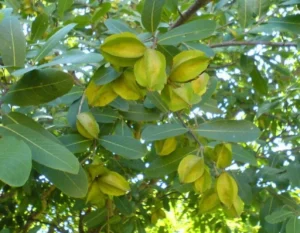Phyllanthus emblica, also known as Emblica officinalis, amla, Indian gooseberry, or Malacca tree, is a deciduous tree native to tropical and southern Asia. It is a member of the Phyllanthaceae family. The fruits of the tree are a rich source of vitamin C, and they have been used for centuries in traditional medicine for a variety of ailments, including diarrhea, jaundice, inflammation, and diabetes.
In recent years, there has been growing interest in the medicinal properties of Phyllanthus emblica. Scientific studies have shown that the plant contains a number of active compounds with antioxidant, anti-inflammatory, and immune- boosting properties. These compounds may be responsible for the many health benefits of Phyllanthus emblica, including:
- Improved immunity
- Reduced inflammation
- Protection against cancer
- Improved heart health
- Increased cognitive function
- Anti-aging effects
Here are some of the specific medicinal uses of Phyllanthus emblica:
- Diarrhea: The fruit of Phyllanthus emblica has been used traditionally to treat diarrhea. It is thought to work by reducing inflammation in the gut.
- Jaundice: The fruit of Phyllanthus emblica has also been used traditionally to treat jaundice. It is thought to help the liver to break down bilirubin, a substance that can build up in the blood and cause jaundice.
- Inflammation: The fruit, leaves, and bark of Phyllanthus emblica all contain compounds with anti-inflammatory properties. These compounds may be helpful for reducing inflammation in conditions such as arthritis, asthma, and inflammatory bowel disease.
- Diabetes: The fruit of Phyllanthus emblica has been shown to lower blood sugar levels in people with diabetes. It is thought to do this by improving insulin sensitivity and reducing inflammation.
- Cancer: The fruit, leaves, and bark of Phyllanthus emblica all contain compounds with antioxidant and anti-cancer properties. These compounds may help to protect against cancer by preventing cell damage and promoting cell death.
- Brain health: The fruit of Phyllanthus emblica has been shown to improve cognitive function in people with age-related cognitive decline. It is thought to do this by increasing levels of antioxidants in the brain and reducing inflammation.
- Anti-aging: The fruit of Phyllanthus emblica is rich in antioxidants, which can help to protect the body from damage caused by free radicals. Free radicals are thought to be a major cause of aging and age-related diseases.
Biological Sources –
The biological sources of Phyllanthus emblica are the fruits, leaves, and bark of the plant. The fruits are the most commonly used part of the plant, and they are a rich source of vitamin C, antioxidants, and other nutrients. The leaves and bark also contain a number of active compounds with potential health benefits.






Reviews
There are no reviews yet.